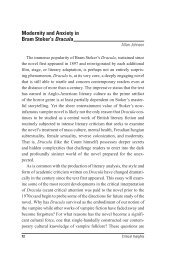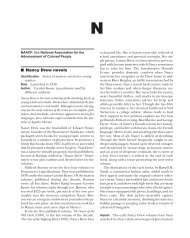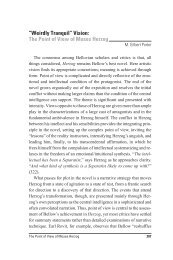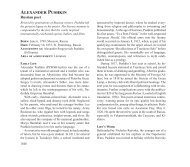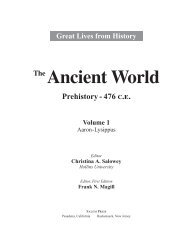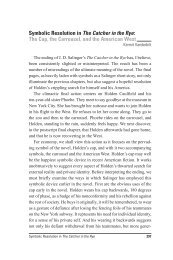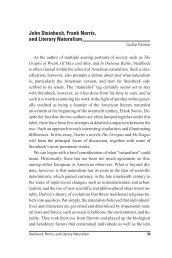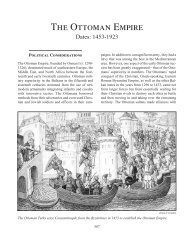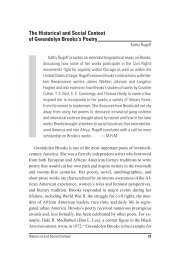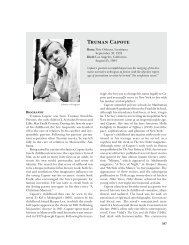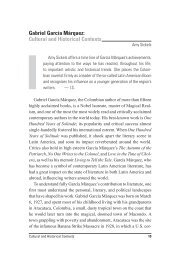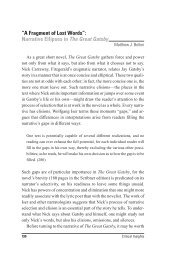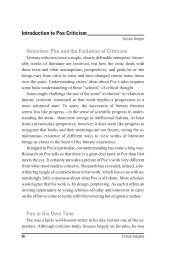Heracles's twelve labors - Salem Press
Heracles's twelve labors - Salem Press
Heracles's twelve labors - Salem Press
Create successful ePaper yourself
Turn your PDF publications into a flip-book with our unique Google optimized e-Paper software.
Heracles’s Twelve Labors │ 75<br />
“When Hercules [Heracles] asked Pluto<br />
[Hades] for Cerberus, Pluto ordered<br />
him to take the animal provided he mastered<br />
him without the use of the weapons<br />
which he carried. Hercules found him at<br />
the gates of Acheron, and, cased in his<br />
cuirass and covered by the lion’s skin,<br />
he flung his arms round the head of the<br />
brute, and though the dragon in its tail<br />
bit him, he never relaxed his grip and<br />
pressure till it yielded.”<br />
Bibliotheca<br />
that he never enter the city again and instead bring proof<br />
that he has completed each task to the city gates. Next,<br />
Heracles slays the Lernaean hydra, a nine-headed beast<br />
that had been killing cattle throughout the countryside.<br />
When he fights the monster, he realizes that for every<br />
head he cuts off, two more grow in its place, and so he<br />
instructs his nephew, Iolaus, to burn the necks to prevent<br />
new heads from growing back. Eurystheus, however,<br />
denies the success of this labor, as Iolaus had assisted<br />
Heracles in the battle.<br />
For his third labor, Heracles captures the Cerynitian<br />
hind, a beast precious to the goddess Artemis, after chasing<br />
it for an entire year. Next, he goes to capture the Erymanthian<br />
boar. While this task is simple compared to the<br />
others, Heracles stops to visit the centaur Pholus and,<br />
after being convinced to drink the wine that belongs to<br />
the other centaurs, finds himself in a bloody battle when<br />
those centaurs return. For his fifth labor, Heracles is ordered<br />
to dispose of the dung of the cattle of King Augeas<br />
in a single day. The son of a god, Augeas has seemingly<br />
endless cattle. After convincing the king to pay him for<br />
the work, Heracles redirects mighty rivers into the cattle<br />
yards, washing the dung away. However, Eurystheus rejects<br />
this labor on the grounds that Heracles received<br />
payment for completing it.<br />
For his sixth labor, Heracles chases away the birds<br />
of Stymphalus by clanging together castanets given to<br />
him by the goddess Athena. Next, he captures the Cretan<br />
bull, showing it to Eurystheus before letting it go free<br />
again. For his eighth labor, he captures the man-eating<br />
mares of King Diomedes, the son of the god Ares. In addition<br />
to slaying Diomedes and taking the mares, Heracles<br />
founds a new city on the grave of Abderus, who had<br />
been the mares’ caretaker before dying during the battle.<br />
For his ninth labor, Heracles goes to fetch the belt of<br />
Hippolyte, who is the queen of the Amazons, a community<br />
of fierce warrior women. On the way to Hippolyte,<br />
he slays a massive army that attacks his ships. Hippolyte<br />
at first offers the belt freely, but Hera, disguised as an<br />
Amazon, convinces the female army to attack Heracles,<br />
and so he is forced to kill them all. Next, Heracles travels<br />
a great distance and kills many people in order to<br />
fetch the cattle of Geryon, a monster with the body of<br />
three men.<br />
Eight years and one month after the start of the <strong>labors</strong>,<br />
Heracles finishes the tenth task. However, because<br />
he received help with the second labor and payment for<br />
the fifth, Eurystheus requires two more tasks of him.<br />
For his eleventh labor, Heracles must fetch the apples<br />
of the Hesperides from the ends of the earth, where they<br />
are guarded by the Hesperides themselves as well as an<br />
immortal dragon. Rather than steal the apples himself,<br />
however, he convinces the Titan Atlas to do so for him.<br />
Because Atlas has been punished by Zeus and tasked<br />
with holding up the sky, Heracles takes his position temporarily<br />
and tricks Atlas into holding the sky when he<br />
returns. Finally, Heracles enters the underworld itself<br />
to capture Cerberus, a three-headed hellhound with the<br />
tail of a dragon. After successfully wrestling the beast<br />
without using weapons, Heracles is allowed to bring it<br />
to the gates of Eurystheus, though he returns it shortly<br />
after. With this final labor complete, Heracles concludes<br />
his obligation to Eurystheus, having done exactly as the<br />
oracle of Delphi asked of him years before.<br />
Analysis<br />
The lyric poet Pindar, one of the most influential poets<br />
of ancient Greece, describes Heracles with the term<br />
hereos theos, meaning that he is both a hero and a god.<br />
This epithet captures the core of the myth that surrounds<br />
Heracles. Born to a mortal mother from her union with<br />
an immortal god, living as the greatest earthly hero before<br />
ascending to the heights of Mount Olympus, and<br />
at once cursed and blessed by the most powerful deities<br />
in the Greek pantheon, Heracles is the rare figure that<br />
transcends the divide between the realm of the mortals<br />
and that of the gods.<br />
MYTHHERO_Book.indb 75<br />
8/20/2013 2:14:01 PM



